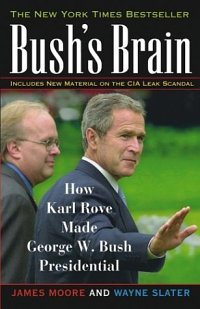 | |
| Author | James Moore and Wayne Slater |
|---|---|
| Language | English |
| Publisher | John Wiley & Sons, Inc. |
Publication date | 2003 |
| ISBN | 0-471-47140-2 |
| OCLC | 51873453 |
Bush's Brain: How Karl Rove Made George W. Bush Presidential is a book by James Moore and Wayne Slater that chronicles the political career of Karl Rove and the role he has played in the elections of George W. Bush, both when running for Governor of Texas and for president. It was published in 2003 by John Wiley & Sons, Inc. ISBN 0-471-47140-2.
Contents
- Film
- Reception
- Other works by the authors
- James Moore and Wayne Slater
- James Moore
- Notes
- References
- External links
In 2004, a documentary film was directed and produced by Joseph Mealey and Michael Paradies Shoob
with the shortened title, Bush's Brain. In that film, a series of political insiders of both major parties suggest that Karl Rove, President George W. Bush's closest advisor, has almost single-handedly shaped United States executive branch policies, since the days when George W. Bush was running for Governor of Texas. The documentary film, available on DVD (DVD release date: February 15, 2005, run time: 80 minutes), is narrated by Jacques Vroom, Jr. and contains a soundtrack featuring the music of singer-songwriter political activist, Michelle Shocked.
Moore and Slater have followed up that book, after the 2004 Presidential election, with Rove Exposed: How Bush's Brain Fooled America (2005) ISBN 0-471-78708-6.